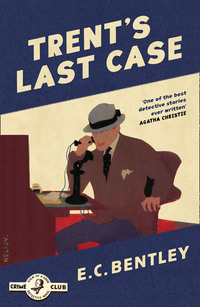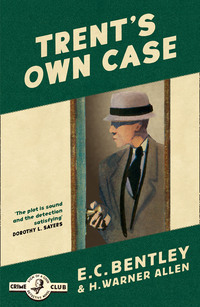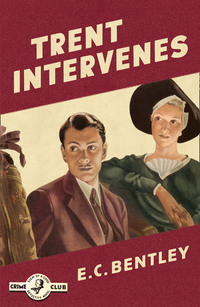
Полная версия
Trent's Last Case


Titel: Trent's Last Case
von ca. 337-422 Faxian, Sir Samuel White Baker, Sax Rohmer, Bernardin de Saint-Pierre, Maria Edgeworth, Saint Sir Thomas More, Herodotus, L. Mühlbach, Herbert Allen Giles, G. K. Chesterton, Algernon Charles Swinburne, Rudyard Kipling, A. J. O'Reilly, William Bray, O. Henry, graf Leo Tolstoy, Anonymous, Lewis Wallace, Johann Wolfgang von Goethe, Edgar Allan Poe, Jack London, Elizabeth Cleghorn Gaskell, Jules Verne, Frank Frankfort Moore, Susan Fenimore Cooper, Anthony Trollope, Henry James, T. Smollett, Thomas Burke, Emma Goldman, George Eliot, Henry Rider Haggard, Baron Thomas Babington Macaulay Macaulay, A. Maynard Barbour, Edmund Burke, Gerold K. Rohner, Bernard Shaw, Sir Joshua Reynolds, Bret Harte, Nathaniel Hawthorne, Jerome K. Jerome, Isabella L. Bird, Christoph Martin Wieland, Rainer Maria Rilke, Ludwig Anzengruber, Freiherr von Ludwig Achim Arnim, G. Harvey Ralphson, John Galsworthy, George Sand, Pierre Loti, Fyodor Dostoyevsky, Giambattista Basile, Homer, John Webster, P. G. Wodehouse, William Shakespeare, Edward Payson Roe, Sir Walter Raleigh, Victor [pseud.] Appleton, Arnold Bennett, James Fenimore Cooper, James Hogg, Richard Harding Davis, Ernest Thompson Seton, William MacLeod Raine, E. Phillips Oppenheim, Maksim Gorky, Henrik Ibsen, George MacDonald, Sir Max Beerbohm, Lucy Larcom, Various, Sir Robert S. Ball, Charles Darwin, Charles Reade, Adelaide Anne Procter, Joseph Conrad, Joel Chandler Harris, Joseph Crosby Lincoln, Alexander Whyte, Kate Douglas Smith Wiggin, James Lane Allen, Richard Jefferies, Honoré de Balzac, Wilhelm Busch, General Robert Edward Lee, Charles Dickens, Wilkie Collins, David Cory, Booth Tarkington, George Rawlinson, Sir Arthur Conan Doyle, Dinah Maria Mulock Craik, Christopher Evans, Thomas Henry Huxley, Mary Roberts Rinehart, Erskine Childers, Alice Freeman Palmer, Florence Converse, William Congreve, Stephen Crane, Madame de La Fayette, United States. Army. Corps of Engineers. Manhattan District, Willa Sibert Cather, Anna Katharine Green, Oliver Wendell Holmes, Charlotte M. Brame, Alphonse Daudet, Booker T. Washington, Clemens Brentano, Sylvester Mowry, Geoffrey Chaucer, Ellen Anderson Gholson Glasgow, Gail Hamilton, William Roscoe Thayer, Margaret Wade Campbell Deland, Rafael Sabatini, Archibald Henderson, Albert Payson Terhune, George Wharton James, Padraic Colum, James MacCaffrey, John Albert Macy, Annie Sullivan, Helen Keller, Walter Pater, Sir Richard Francis Burton, Baron de Jean-Baptiste-Antoine-Marcelin Marbot, Aristotle, Gustave Flaubert, 12th cent. de Troyes Chrétien, Valentine Williams, Thomas Wentworth Higginson, Alexandre Dumas fils, John Gay, Andrew Lang, Hester Lynch Piozzi, Jeffery Farnol, Alexander Pope, George Henry Borrow, Mark Twain, Francis Bacon, Margaret Pollock Sherwood, Henry Walter Bates, Thornton W. Burgess, Edmund G. Ross, William Alexander Linn, Voltaire, Giles Lytton Strachey, Henry Ossian Flipper, Émile Gaboriau, Arthur B. Reeve, Hugh Latimer, Baron Edward Bulwer Lytton Lytton, Benito Pérez Galdós, Robert Smythe Hichens, Niccolò Machiavelli, Prosper Mérimée, Ivan Sergeevich Turgenev, Anatole Cerfberr, Jules François Christophe, Victor Cherbuliez, Edgar B. P. Darlington, David Grayson, Mihai Nadin, Helen Beecher Long, Plutarch, Harriet Beecher Stowe, Margaret E. Sangster, Herman Melville, John Keats, Fannie Isabel Sherrick, Maurice Baring, William Terence Kane, Mary Russell Mitford, Henry Drummond, Rabindranath Tagore, Hubert Howe Bancroft, Charlotte Mary Yonge, William Dean Howells, Jesse F. Bone, Basil Hall Chamberlain, William Makepeace Thackeray, Samuel Butler, Frances Hodgson Burnett, E. Prentiss, Sir Walter Scott, Alexander K. McClure, David Livingstone, Bram Stoker, Victor Hugo, Patañjali, Amelia Ruth Gere Mason, Bertrand Russell, Alfred Russel Wallace, Molière, Robert Louis Stevenson, Simona Sumanaru, Michael Hart, Edmund Gosse, Samuel Smiles, Pierre Corneille, Clarence Edward Mulford, Mrs. Oliphant, George Pope Morris, Aristophanes, baron de Etienne-Léon Lamothe-Langon, William Morris, Henry David Thoreau, E. C. Bentley
ISBN 978-3-7429-2473-5
Alle Rechte vorbehalten.
Es ist ohne vorherige schriftliche Erlaubnis nicht gestattet, dieses Werk im Ganzen oder in Teilen zu vervielfältigen oder zu veröffentlichen.
TRENT'S LAST CASE
THE WOMAN IN BLACK
By E.C. (Edmund Clerihew) Bentley
Contents
CHAPTER I. Bad News CHAPTER II. Knocking the Town Endways CHAPTER III. Breakfast CHAPTER IV. Handcuffs in the Air CHAPTER V. Poking About CHAPTER VI. Mr Bunner on the Case CHAPTER VII. The Lady in Black CHAPTER VIII. The Inquest CHAPTER IX. A Hot Scent CHAPTER X. The Wife of Dives CHAPTER XI. Hitherto Unpublished CHAPTER XII. Evil Days CHAPTER XIII. Eruption CHAPTER XIV. Writing a Letter CHAPTER XV. Double Cunning CHAPTER XVI. The Last Straw
CHAPTER I: Bad News
Between what matters and what seems to matter, how should the world we know judge wisely?
When the scheming, indomitable brain of Sigsbee Manderson was scattered by a shot from an unknown hand, that world lost nothing worth a single tear; it gained something memorable in a harsh reminder of the vanity of such wealth as this dead man had piled up—without making one loyal friend to mourn him, without doing an act that could help his memory to the least honour. But when the news of his end came, it seemed to those living in the great vortices of business as if the earth too shuddered under a blow.
In all the lurid commercial history of his country there had been no figure that had so imposed itself upon the mind of the trading world. He had a niche apart in its temples. Financial giants, strong to direct and augment the forces of capital, and taking an approved toll in millions for their labour, had existed before; but in the case of Manderson there had been this singularity, that a pale halo of piratical romance, a thing especially dear to the hearts of his countrymen, had remained incongruously about his head through the years when he stood in every eye as the unquestioned guardian of stability, the stamper-out of manipulated crises, the foe of the raiding chieftains that infest the borders of Wall Street.
The fortune left by his grandfather, who had been one of those chieftains on the smaller scale of his day, had descended to him with accretion through his father, who during a long life had quietly continued to lend money and never had margined a stock. Manderson, who had at no time known what it was to be without large sums to his hand, should have been altogether of that newer American plutocracy which is steadied by the tradition and habit of great wealth. But it was not so. While his nurture and education had taught him European ideas of a rich man's proper external circumstance; while they had rooted in him an instinct for quiet magnificence, the larger costliness which does not shriek of itself with a thousand tongues; there had been handed on to him nevertheless much of the Forty-Niner and financial buccaneer, his forbear. During that first period of his business career which had been called his early bad manner, he had been little more than a gambler of genius, his hand against every man's—an infant prodigy—who brought to the enthralling pursuit of speculation a brain better endowed than any opposed to it. At St Helena it was laid down that war is une belle occupation; and so the young Manderson had found the multitudinous and complicated dog-fight of the Stock Exchange of New York.
Then came his change. At his father's death, when Manderson was thirty years old, some new revelation of the power and the glory of the god he served seemed to have come upon him. With the sudden, elastic adaptability of his nation he turned to steady labour in his father's banking business, closing his ears to the sound of the battles of the Street. In a few years he came to control all the activity of the great firm whose unimpeached conservatism, safety, and financial weight lifted it like a cliff above the angry sea of the markets. All mistrust founded on the performances of his youth had vanished. He was quite plainly a different man. How the change came about none could with authority say, but there was a story of certain last words spoken by his father, whom alone he had respected and perhaps loved.
He began to tower above the financial situation. Soon his name was current in the bourses of the world. One who spoke the name of Manderson called up a vision of all that was broad-based and firm in the vast wealth of the United States. He planned great combinations of capital, drew together and centralized industries of continental scope, financed with unerring judgement the large designs of state or of private enterprise. Many a time when he 'took hold' to smash a strike, or to federate the ownership of some great field of labour, he sent ruin upon a multitude of tiny homes; and if miners or steelworkers or cattlemen defied him and invoked disorder, he could be more lawless and ruthless than they. But this was done in the pursuit of legitimate business ends. Tens of thousands of the poor might curse his name, but the financier and the speculator execrated him no more. He stretched a hand to protect or to manipulate the power of wealth in every corner of the country. Forcible, cold, and unerring, in all he did he ministered to the national lust for magnitude; and a grateful country surnamed him the Colossus.
But there was an aspect of Manderson in this later period that lay long unknown and unsuspected save by a few, his secretaries and lieutenants and certain of the associates of his bygone hurling time. This little circle knew that Manderson, the pillar of sound business and stability in the markets, had his hours of nostalgia for the lively times when the Street had trembled at his name. It was, said one of them, as if Blackbeard had settled down as a decent merchant in Bristol on the spoils of the Main. Now and then the pirate would glare suddenly out, the knife in his teeth and the sulphur matches sputtering in his hatband. During such spasms of reversion to type a score of tempestuous raids upon the market had been planned on paper in the inner room of the offices of Manderson, Colefax and Company. But they were never carried out. Blackbeard would quell the mutiny of his old self within him and go soberly down to his counting-house—humming a stave or two of 'Spanish Ladies', perhaps, under his breath. Manderson would allow himself the harmless satisfaction, as soon as the time for action had gone by, of pointing out to some Rupert of the markets a coup worth a million to the depredator might have been made. 'Seems to me,' he would say almost wistfully, 'the Street is getting to be a mighty dull place since I quit.' By slow degrees this amiable weakness of the Colossus became known to the business world, which exulted greatly in the knowledge.
At the news of his death panic went through the markets like a hurricane; for it came at a luckless time. Prices tottered and crashed like towers in an earthquake. For two days Wall Street was a clamorous inferno of pale despair. All over the United States, wherever speculation had its devotees, went a waft of ruin, a plague of suicide. In Europe also not a few took with their own hands lives that had become pitiably linked to the destiny of a financier whom most of them had never seen. In Paris a well-known banker walked quietly out of the Bourse and fell dead upon the broad steps among the raving crowd of Jews, a phial crushed in his hand. In Frankfort one leapt from the Cathedral top, leaving a redder stain where he struck the red tower. Men stabbed and shot and strangled themselves, drank death or breathed it as the air, because in a lonely corner of England the life had departed from one cold heart vowed to the service of greed.
The blow could not have fallen at a more disastrous moment. It came when Wall Street was in a condition of suppressed 'scare'-suppressed, because for a week past the great interests known to act with or to be actually controlled by the Colossus had been desperately combating the effects of the sudden arrest of Lucas Hahn, and the exposure of his plundering of the Hahn banks. This bombshell, in its turn, had fallen at a time when the market had been 'boosted' beyond its real strength. In the language of the place, a slump was due. Reports from the corn-lands had not been good, and there had been two or three railway statements which had been expected to be much better than they were. But at whatever point in the vast area of speculation the shudder of the threatened break had been felt, 'the Manderson crowd' had stepped in and held the market up. All through the week the speculator's mind, as shallow as it is quick-witted, as sentimental as greedy, had seen in this the hand of the giant stretched out in protection from afar. Manderson, said the newspapers in chorus, was in hourly communication with his lieutenants in the Street. One journal was able to give in round figures the sum spent on cabling between New York and Marlstone in the past twenty-four hours; it told how a small staff of expert operators had been sent down by the Post Office authorities to Marlstone to deal with the flood of messages. Another revealed that Manderson, on the first news of the Hahn crash, had arranged to abandon his holiday and return home by the Lusitania; but that he soon had the situation so well in hand that he had determined to remain where he was.
All this was falsehood, more or less consciously elaborated by the 'finance editors', consciously initiated and encouraged by the shrewd business men of the Manderson group, who knew that nothing could better help their plans than this illusion of hero-worship—knew also that no word had come from Manderson in answer to their messages, and that Howard B. Jeffrey, of Steel and Iron fame, was the true organizer of victory. So they fought down apprehension through four feverish days, and minds grew calmer. On Saturday, though the ground beneath the feet of Mr. Jeffrey yet rumbled now and then with Etna-mutterings of disquiet, he deemed his task almost done. The market was firm, and slowly advancing. Wall Street turned to its sleep of Sunday, worn out but thankfully at peace.
In the first trading hour of Monday a hideous rumour flew round the sixty acres of the financial district. It came into being as the lightning comes—a blink that seems to begin nowhere; though it is to be suspected that it was first whispered over the telephone—together with an urgent selling order by some employee in the cable service. A sharp spasm convulsed the convalescent share-list. In five minutes the dull noise of the kerbstone market in Broad Street had leapt to a high note of frantic interrogation. From within the hive of the Exchange itself could be heard a droning hubbub of fear, and men rushed hatless in and out. Was it true? asked every man; and every man replied, with trembling lips, that it was a lie put out by some unscrupulous 'short' interest seeking to cover itself. In another quarter of an hour news came of a sudden and ruinous collapse of 'Yankees' in London at the close of the Stock Exchange day. It was enough. New York had still four hours' trading in front of her. The strategy of pointing to Manderson as the saviour and warden of the markets had recoiled upon its authors with annihilating force, and Jeffrey, his ear at his private telephone, listened to the tale of disaster with a set jaw. The new Napoleon had lost his Marengo. He saw the whole financial landscape sliding and falling into chaos before him. In half an hour the news of the finding of Manderson's body, with the inevitable rumour that it was suicide, was printing in a dozen newspaper offices; but before a copy reached Wall Street the tornado of the panic was in full fury, and Howard B. Jeffrey and his collaborators were whirled away like leaves before its breath.
All this sprang out of nothing.
Nothing in the texture of the general life had changed. The corn had not ceased to ripen in the sun. The rivers bore their barges and gave power to a myriad engines. The flocks fattened on the pastures, the herds were unnumbered. Men laboured everywhere in the various servitudes to which they were born, and chafed not more than usual in their bonds. Bellona tossed and murmured as ever, yet still slept her uneasy sleep. To all mankind save a million or two of half-crazed gamblers, blind to all reality, the death of Manderson meant nothing; the life and work of the world went on. Weeks before he died strong hands had been in control of every wire in the huge network of commerce and industry that he had supervised. Before his corpse was buried his countrymen had made a strange discovery—that the existence of the potent engine of monopoly that went by the name of Sigsbee Manderson had not been a condition of even material prosperity. The panic blew itself out in two days, the pieces were picked up, the bankrupts withdrew out of sight; the market 'recovered a normal tone'.
While the brief delirium was yet subsiding there broke out a domestic scandal in England that suddenly fixed the attention of two continents. Next morning the Chicago Limited was wrecked, and the same day a notable politician was shot down in cold blood by his wife's brother in the streets of New Orleans. Within a week of its rising, 'the Manderson story', to the trained sense of editors throughout the Union, was 'cold'. The tide of American visitors pouring through Europe made eddies round the memorial or statue of many a man who had died in poverty; and never thought of their most famous plutocrat. Like the poet who died in Rome, so young and poor, a hundred years ago, he was buried far away from his own land; but for all the men and women of Manderson's people who flock round the tomb of Keats in the cemetery under the Monte Testaccio, there is not one, nor ever Will be, to stand in reverence by the rich man's grave beside the little church of Marlstone.
CHAPTER II: Knocking the Town Endways
In the only comfortably furnished room in the offices of the Record, the telephone on Sir James Molloy's table buzzed. Sir James made a motion with his pen, and Mr. Silver, his secretary, left his work and came over to the instrument.
'Who is that?' he said. 'Who?... I can't hear you.... Oh, it's Mr. Bunner, is it?... Yes, but... I know, but he's fearfully busy this afternoon. Can't you... Oh, really? Well, in that case—just hold on, will you?'
He placed the receiver before Sir James. 'It's Calvin Bunner, Sigsbee Manderson's right-hand man,' he said concisely. 'He insists on speaking to you personally. Says it is the gravest piece of news. He is talking from the house down by Bishopsbridge, so it will be necessary to speak clearly.'
Sir James looked at the telephone, not affectionately, and took up the receiver. 'Well?' he said in his strong voice, and listened. 'Yes,' he said. The next moment Mr. Silver, eagerly watching him, saw a look of amazement and horror. 'Good God!' murmured Sir James. Clutching the instrument, he slowly rose to his feet, still bending ear intently. At intervals he repeated 'Yes.' Presently, as he listened, he glanced at the clock, and spoke quickly to Mr. Silver over the top of the transmitter. 'Go and hunt up Figgis and young Williams. Hurry.' Mr. Silver darted from the room.
The great journalist was a tall, strong, clever Irishman of fifty, swart and black-moustached, a man of untiring business energy, well known in the world, which he understood very thoroughly, and played upon with the half-cynical competence of his race. Yet was he without a touch of the charlatan: he made no mysteries, and no pretences of knowledge, and he saw instantly through these in others. In his handsome, well-bred, well-dressed appearance there was something a little sinister when anger or intense occupation put its imprint about his eyes and brow; but when his generous nature was under no restraint he was the most cordial of men. He was managing director of the company which owned that most powerful morning paper, the Record, and also that most indispensable evening paper, the Sun, which had its offices on the other side of the street. He was, moreover, editor-in-chief of the Record, to which he had in the course of years attached the most variously capable personnel in the country. It was a maxim of his that where you could not get gifts, you must do the best you could with solid merit; and he employed a great deal of both. He was respected by his staff as few are respected in a profession not favourable to the growth of the sentiment of reverence.
'You're sure that's all?' asked Sir James, after a few minutes of earnest listening and questioning. 'And how long has this been known?... Yes, of course, the police are; but the servants? Surely it's all over the place down there by now.... Well, we'll have a try.... Look here, Bunner, I'm infinitely obliged to you about this. I owe you a good turn. You know I mean what I say. Come and see me the first day you get to town.... All right, that's understood. Now I must act on your news. Goodbye.'
Sir James hung up the receiver, and seized a railway timetable from the rack before him. After a rapid consultation of this oracle, he flung it down with a forcible word as Mr. Silver hurried into the room, followed by a hard-featured man with spectacles, and a youth with an alert eye.
'I want you to jot down some facts, Figgis,' said Sir James, banishing all signs of agitation and speaking with a rapid calmness. 'When you have them, put them into shape just as quick as you can for a special edition of the Sun.' The hard-featured man nodded and glanced at the clock, which pointed to a few minutes past three; he pulled out a notebook and drew a chair up to the big writing-table. 'Silver,' Sir James went on, 'go and tell Jones to wire our local correspondent very urgently, to drop everything and get down to Marlstone at once. He is not to say why in the telegram. There must not be an unnecessary word about this news until the Sun is on the streets with it—you all understand. Williams, cut across the way and tell Mr. Anthony to hold himself ready for a two-column opening that will knock the town endways. Just tell him that he must take all measures and precautions for a scoop. Say that Figgis will be over in five minutes with the facts, and that he had better let him write up the story in his private room. As you go, ask Miss Morgan to see me here at once, and tell the telephone people to see if they can get Mr. Trent on the wire for me. After seeing Mr. Anthony, return here and stand by.' The alert-eyed young man vanished like a spirit.




